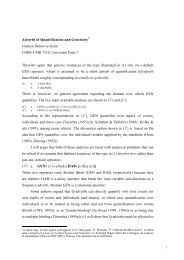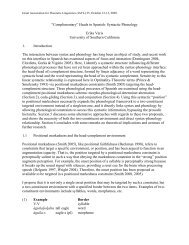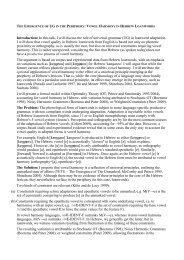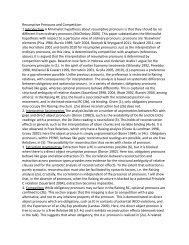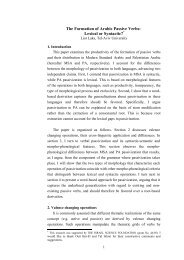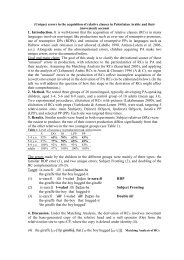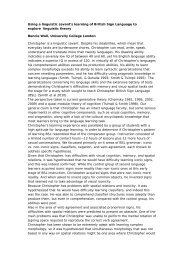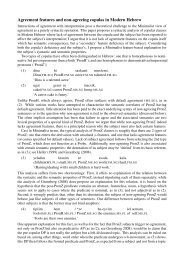paper
paper
paper
You also want an ePaper? Increase the reach of your titles
YUMPU automatically turns print PDFs into web optimized ePapers that Google loves.
2.4 Semantic Difference<br />
The meaning of s ’with’ sometimes makes it difficult to distinguish between the adjunct<br />
reading (13a) and the conjunct reading as in (13b):<br />
(13) (a) [adjunction]<br />
Maša<br />
Masha<br />
xodit<br />
goes.SG<br />
s<br />
with<br />
Dašei<br />
Dasha<br />
Masha and Dasha go to school.<br />
(b) [coordination]<br />
Maša<br />
Masha<br />
s<br />
with<br />
Dašei<br />
Dasha<br />
xodjat<br />
go.PL<br />
v<br />
to<br />
Masha and Dasha go to school.<br />
v<br />
to<br />
školu.<br />
school<br />
školu.<br />
school<br />
It is hard to put one’s finger on the semantic difference between the comitative adjunction<br />
and the comitative coordination. However, there are ways to disambiguate a construction,<br />
forcing a coordination-only meaning 1 . Coordinate constructions can have either a collective<br />
or a distributive reading, whereas s-adjuncts can have only a collective reading, as in<br />
the English example: Mary read the book with John. An s-adjunct cannot modify a verb<br />
that demands a distributive reading. Thus, for example, verbs such as believe or know will<br />
not have with-modifiers. However, s-phrases with coordinate meanings are acceptable with<br />
these verbs in (14b) just as are regular coordinated subjects (14c):<br />
(14) (a) [adjunction]<br />
*Maša<br />
Masha<br />
verit<br />
believe.3SG.Pres<br />
s<br />
with<br />
Dašei<br />
Dasha.Instr<br />
*Masha believes in God with Dasha.<br />
(b) [s-coordination]<br />
Maša<br />
Masha<br />
s<br />
with<br />
Dašei<br />
Dasha.Instr<br />
verjat<br />
believe.3PL.Pres<br />
Masha and Dasha believe in God.<br />
(c) [ordinary coordination]<br />
Maša<br />
Masha<br />
i<br />
and<br />
Daša<br />
Dasha.Instr<br />
verjat<br />
believe.3PL.Pres<br />
Masha and Dasha believe in God.<br />
v<br />
in<br />
v<br />
in<br />
v<br />
in<br />
boga.<br />
God<br />
boga.<br />
God<br />
boga.<br />
God<br />
1 The cases discussed in this section serve as counterexamples to the claim made by McNally (1993) that<br />
comitatives always have a collective reading.



